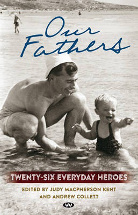Our fathers edited by Judy Macpherson Kent and Andrew Collett

Wakefield Press, 2014. ISBN 9781743053133.
Recommended. Fatherhood. Family history. South Australia's social
history. Work in Australia (post War focus). World War II. Suburban
life. A school reunion led to the reflections of a collection of
former Linden Park Primary students about their fathers. This
could have been a somewhat self-indulgent collection of anecdotes;
instead it is an amazing look into post-war life in Adelaide when
the homes in the inner leafy eastern suburbs around Linden Park were
being built and settled by hard-working and 'ordinary' Australian
families. The jigsaw puzzle insight into war experiences (as shared
with their families) and the impact of the early experiences of
these fathers and then their own relationships with their children
(born mostly in 1950) slowly reveals a broader picture of social
life. I delighted in seeing glimpses of the changes in work
and social expectations and the make-do attitudes of those who were
rearing children during the 1950's. Children of today will
have their own stories to tell of social change through their
childhood, but this book shares snapshots through the lens of those
who lived this period of South Australian growth and change. I loved
revisiting the period when children played freely in their
neighbourhoods with classmates, climbing trees, exploring mines and
bushland without an adult in sight; riding billycarts and bikes
without helmets; being taught to drive by their fathers on dirt
roads, and fixing cars in the back yard and going to Rowley Park
Speedway; and being delighted with the occasional simple treat from
a hard-working man who was often a self-made expert in new
technologies. All of this with the rule to be home by 6pm for tea!
This is unapologetically a book about fathers, some of them born
overseas, and the war experiences of many of these men adds a wider
global history. The silence of some in sharing their own war
history speaks loudly of the personal cost of participation in
conflict. As the introduction suggests there could equally be a book
to follow about the mothers. Obviously a book of this nature
is always fraught with the difficulties of distorted memories,
however they are our South Australian memories, and it is not told
as a history, but as an insight into the ordinary lives of ordinary
heroes.
(Note: School students may not connect with this book as a whole,
but the individual stories could be used by students of History to
connect with South Australia's past.)
Carolyn Hull